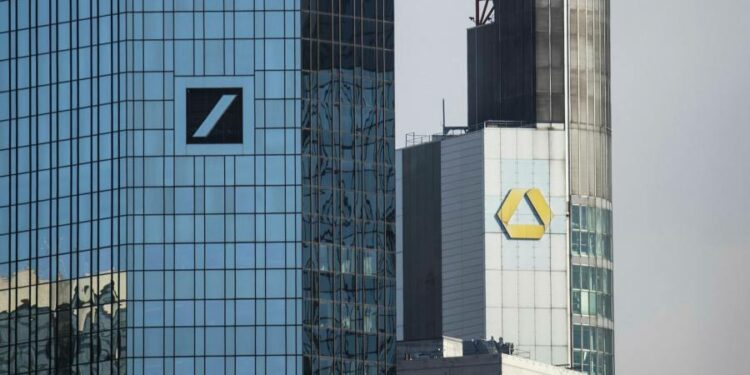Heads must be shaking in the C-suites of Germany’s two largest banks this week. A large shareholder dumped its holdings in Deutsche Bank and Commerzbank on Tuesday via discounted secondary placements. The shares fell about 8 per cent.
Respective chief executives Christian Sewing and Manfred Knof must feel frustrated. The sales came after the earnings and share prices for both banks had staged recoveries. The two men can take some perverse comfort from the thought that a vulnerable EU economy may be to blame.
The sales were worth €1.75bn in total, with the bulk of the shares in Deutsche. Capital Group, the US fund giant, has been confirmed as the seller for Deutsche Bank.
Exiting the position now makes sense. Germany is struggling to lessen its dependence on Russian gas. Tough choices may have to be made between energy for households or industry. Economic slowdown looms for the EU. Investors in European banks are rethinking their exposures. A stalling German economy would surely hurt Deutsche and Commerzbank.
Higher interest rates should help with loan pricing while inflation remains steep. Indeed, Sewing has promised Deutsche’s shareholders he can more than double returns on tangible equity to 10 per cent by 2025, partly based on better returns from the loan book. At Commerzbank, Knof has pointed to a windfall of more than €1bn by 2024 from rising rates. But if loan defaults rise, those gains could reverse.
The two stocks are now cheap, trading at under half their tangible book values. Neither had caught up with the sector’s 0.75 times rating, though at least Deutsche had returned to pre-pandemic levels. Furthermore, one has to look back a decade to find better returns on tangible equity for Deutsche. One might forgive some hands-on-hips frustration from Sewing.
But the vendors’ good timing tells a more positive story. Capital loaded up on both banks when their share prices collapsed in early 2020, buying more last year. Both stocks’ prices have far outpaced the broader Dax index in the past two years, and MSCI’s Europe Banks index. On Deutsche Bank, Capital probably earned about 47 per cent altogether, on Lex calculations. Why not lock-in those gains?
Until recently, European banks provided risk-on trades for portfolio managers anticipating a post-pandemic economic boom. Russia’s invasion of Ukraine undermines that premise. Expect other similarly placed investors to consider following Capital’s lead.











